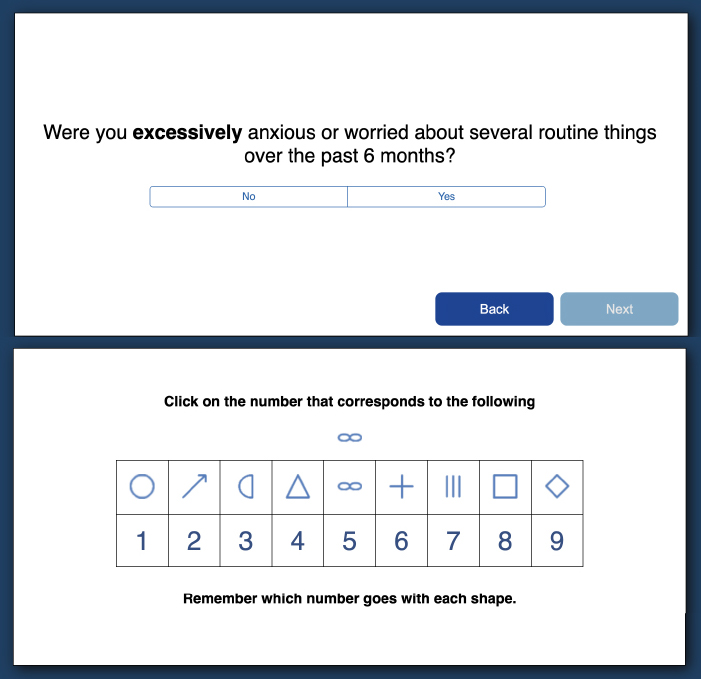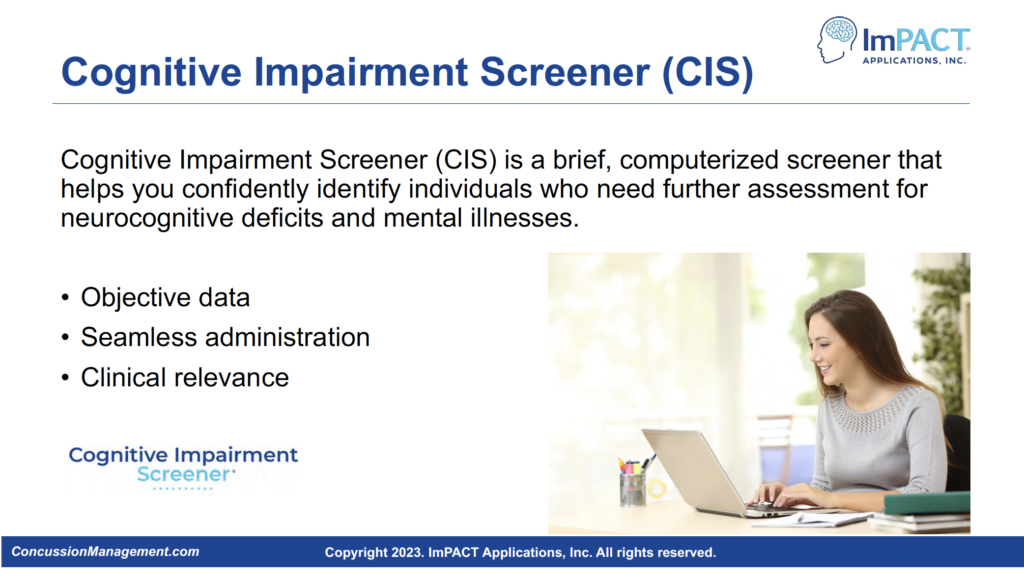
Get objective data about patients’ cognitive and psychiatric status in just 10 minutes.
Cognitive Impairment Screener™ (CIS) is a brief, computerized neuro-cog testing tool that helps you confidently identify individuals, ages 18-80, who need further assessment for neurocognitive deficits and mental illnesses.

Add Cognitive Impairment Screener (CIS) to your practice for $12 per test.
Objective data:
Cognitive Impairment Screener™ (CIS) consists of a 16-question psychiatric questionnaire and two proven neurocognitive test modules that measure visual memory, verbal memory and performance speed. It generates a clinical report of test results to help you with interpretation decision making and documentation.
Seamless administration:
Administered remotely or in-person, patients ages 18-80 can complete this cognitive impairment screening in 10 minutes with just a computer and internet connection.
Clinical Relevance:
Potential use cases for the Cognitive Impairment Screener™ (CIS) include identifying early indicators of dementia, understanding the cognitive impact of viruses such as COVID-19, assessing cognitive deficits after a motor vehicle accident, and more.
Why is Cognitive Impairment Screener (CIS) the right choice?
It's affordable
Include CIS in your medical evaluations for just $10 each and get reimbursed by using 96116 billing code.
It saves time
CIS is 100% computerized and can be administered remotely or in person in just 10 minutes.
Help patients better understand their path to recovery. Download the CIS Patient Journey flowchart and share it with your patients.
What is cognitive impairment screening and why is it important?
Early detection of cognitive impairment is important to help healthcare providers identify and treat underlying conditions. Cognitive impairment causes can include a variety of underlying health conditions, medication side effects, vitamin deficiencies, and other circumstances. Cognitive impairment screening tools measure a variety of brain processes by asking the patient to answer a series of questions and/or complete specific tasks. They paint a picture of patients’ cognitive status in order to identify the presence of cognitive impairments and determine if further evaluation is needed.
What are common cognitive impairment symptoms?
Cognitive impairment symptoms may be mild in the early stages of a cognitive disorder but can steadily progress and become an interference to daily life. It’s important to identify cognitive impairments early on so the underlying cause(s) can be treated.
While cognitive impairment symptoms may vary depending on the underlying condition they commonly include:
- Confusion
- Memory loss (short- or long-term)
- Impaired judgement
What are cognitive disorders?
Cognitive disorders include any condition that causes significant cognitive impairments to the point that medical intervention is necessary. Cognitive disorders can result from a variety of causes including physical injury, substance abuse, hormonal imbalances, and others.
Common cognitive disorders include:
- Dementia
- Developmental Disorders
- Amnesia
How does Coronavirus (COVID-19) affect the brain?
Worldwide patient data shows that patients with COVID-19 experienced a variety of symptoms related to the brain including:
- Confusion
- Loss of consciousness
- Stroke
- Trouble focusing
- Changes in behavior
- Headaches
- Loss of smell and taste
The research available suggests that individuals who have had COVID-19 may continue to experience cognitive and psychological deficits even after recovering from the virus. More research is needed to better understand the long-term effects of COVID-19 on the brain.
